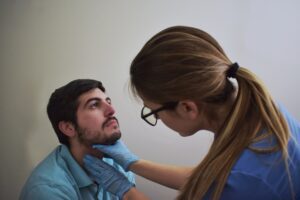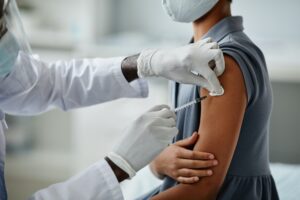

Respiratory protection is of paramount importance in ensuring the safety and well-being of employees in various work environments. One critical aspect of maintaining a safe workplace is conducting respirator clearance and fitting exams. In this blog post, we will explore the significance of these exams and how Advanced OccMed, a leading medical practice specializing in occupational health, can help ensure workplace safety through comprehensive respiratory protection.
Respirator clearance involves assessing an individual’s health and determining their suitability for wearing a respirator. It is essential to evaluate employees’ medical conditions, physical fitness, and other factors that may affect their ability to use respiratory protective equipment effectively. Regulatory requirements, such as those set by the Occupational Safety and Health Administration (OSHA), mandate the completion of respirator clearance exams to ensure the health and safety of workers.
Moreover, different types of respirators are designed for specific workplace hazards. Whether it’s filtering facepiece respirators, half-face or full-face respirators, or powered air-purifying respirators (PAPRs), each type has its unique applications. By undergoing respirator clearance, employees can be properly matched with the appropriate respirator based on their work environment and potential hazards.
The respirator fitting exam is a comprehensive procedure that involves several steps to ensure a proper fit and functionality of the respirator. Let’s take a closer look at the key components of this exam:
Respirator clearance and fitting exams offer numerous benefits for both employees and employers, including:
Urine testing has diverse applications in occupational medicine. Some of these include:
While respirator clearance and fitting exams are crucial for workplace safety, several challenges may arise during the process. It’s important to address these challenges effectively to ensure accurate results and reliable respiratory protection. Some common challenges include:
Advanced OccMed takes a comprehensive and individualized approach to respirator clearance and fitting exams. As a trusted medical practice specializing in occupational health, they offer the following:
In addition to respirator clearance and fitting exams, training and education play a vital role in ensuring effective respiratory protection. Some key points to consider include:
Respirator clearance and fitting exams are fundamental for ensuring workplace safety and protecting employees from respiratory hazards. By partnering with Advanced OccMed and following proper procedures, employers can ensure that their workforce has access to the most suitable respiratory protection. Remember, maintaining a safe work environment is not only a legal obligation but also a moral responsibility towards the well-being of employees.
Respirator clearance and fitting exams are important for several reasons:
Employees who are required to wear respirators as part of their job duties should undergo these exams. This includes workers in industries such as construction, healthcare, manufacturing, and painting, among others. It is important to consult regulatory guidelines and industry-specific requirements to determine the exact scope and frequency of these exams.
The frequency of these exams depends on various factors, including regulatory requirements and workplace conditions. Generally, initial clearance exams should be conducted before an employee starts wearing a respirator. Subsequent exams are typically performed annually, but certain circumstances may necessitate more frequent evaluations, such as significant weight changes or facial structure alterations.
During a respirator clearance and fitting exam, employees can expect the following:
Yes, facial hair can interfere with the seal of a respirator, compromising its effectiveness. In general, it is recommended to be clean-shaven in areas where the respirator seals against the face. Employers may have specific policies regarding facial hair and respirator use, and employees should adhere to those guidelines for optimal protection.
Yes, there are different types of respirators available, including filtering facepiece respirators (FFRs) and elastomeric respirators. The selection of the appropriate respirator depends on the nature of the workplace hazards and the level of respiratory protection required. Advanced OccMed can provide guidance on selecting the right respirator for specific job roles and hazards.
In some cases, employees may have their own respirators that have been properly fitted. However, it is essential to ensure that the respirators meet regulatory standards and provide adequate protection for the specific workplace hazards. Advanced OccMed can evaluate the suitability of employees’ personal respirators and provide recommendations accordingly.
Here are some reputable websites that provide valuable information on respirator clearance and fitting exams:
For more information about urine testing, you can visit the following websites:




